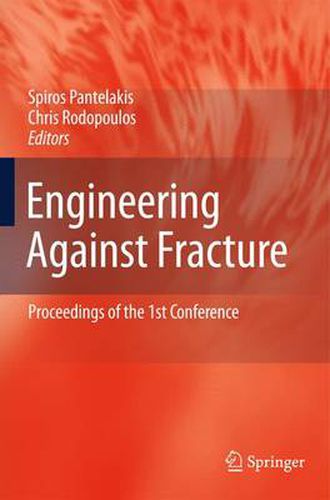Readings Newsletter
Become a Readings Member to make your shopping experience even easier.
Sign in or sign up for free!
You’re not far away from qualifying for FREE standard shipping within Australia
You’ve qualified for FREE standard shipping within Australia
The cart is loading…






This title is printed to order. This book may have been self-published. If so, we cannot guarantee the quality of the content. In the main most books will have gone through the editing process however some may not. We therefore suggest that you be aware of this before ordering this book. If in doubt check either the author or publisher’s details as we are unable to accept any returns unless they are faulty. Please contact us if you have any questions.
Within the last thirty years there is a growing acknowledgement that prevention of catastrophic failures necessitates engagement of a large pool of expertise. Herein it is not excessive to seek advice from disciplines like materials science, structural engineering, mathematics, physics, reliability engineering and even economics. Today’s engineering goals, independently of size; do not have the luxury of being outsideaglobalperspective.Survivaloftheintegratedmarketsand?nancialsystems require a web of safe transportation, energy production and product manufacturing. It is perhaps the ?rst decade in engineering history that multidisciplinary - proaching is not just an idea that needs to materialise but has matured beyond infancy. We can witness such transition by examining engineering job descriptions and postgraduate curricula. The undertaking of organising a conference to re?ect the above was not easy and de?nitely, not something that was brought to life without a lot of work and c- st mitment. The 1 Conference of Engineering Against Fracture from its conceptual day until completion was designed in a way of underlying the need of bringing all the key players on a common ground that once properly cultivated can ?ourish. To achieve that the conference themes were numerous and despite their, in principle notional differences, it was apparent that the attendees established such common ground through argumentation. The reader can see this from the variety of research areas re?ected by the works and keynote lecturers presented.
$9.00 standard shipping within Australia
FREE standard shipping within Australia for orders over $100.00
Express & International shipping calculated at checkout
This title is printed to order. This book may have been self-published. If so, we cannot guarantee the quality of the content. In the main most books will have gone through the editing process however some may not. We therefore suggest that you be aware of this before ordering this book. If in doubt check either the author or publisher’s details as we are unable to accept any returns unless they are faulty. Please contact us if you have any questions.
Within the last thirty years there is a growing acknowledgement that prevention of catastrophic failures necessitates engagement of a large pool of expertise. Herein it is not excessive to seek advice from disciplines like materials science, structural engineering, mathematics, physics, reliability engineering and even economics. Today’s engineering goals, independently of size; do not have the luxury of being outsideaglobalperspective.Survivaloftheintegratedmarketsand?nancialsystems require a web of safe transportation, energy production and product manufacturing. It is perhaps the ?rst decade in engineering history that multidisciplinary - proaching is not just an idea that needs to materialise but has matured beyond infancy. We can witness such transition by examining engineering job descriptions and postgraduate curricula. The undertaking of organising a conference to re?ect the above was not easy and de?nitely, not something that was brought to life without a lot of work and c- st mitment. The 1 Conference of Engineering Against Fracture from its conceptual day until completion was designed in a way of underlying the need of bringing all the key players on a common ground that once properly cultivated can ?ourish. To achieve that the conference themes were numerous and despite their, in principle notional differences, it was apparent that the attendees established such common ground through argumentation. The reader can see this from the variety of research areas re?ected by the works and keynote lecturers presented.